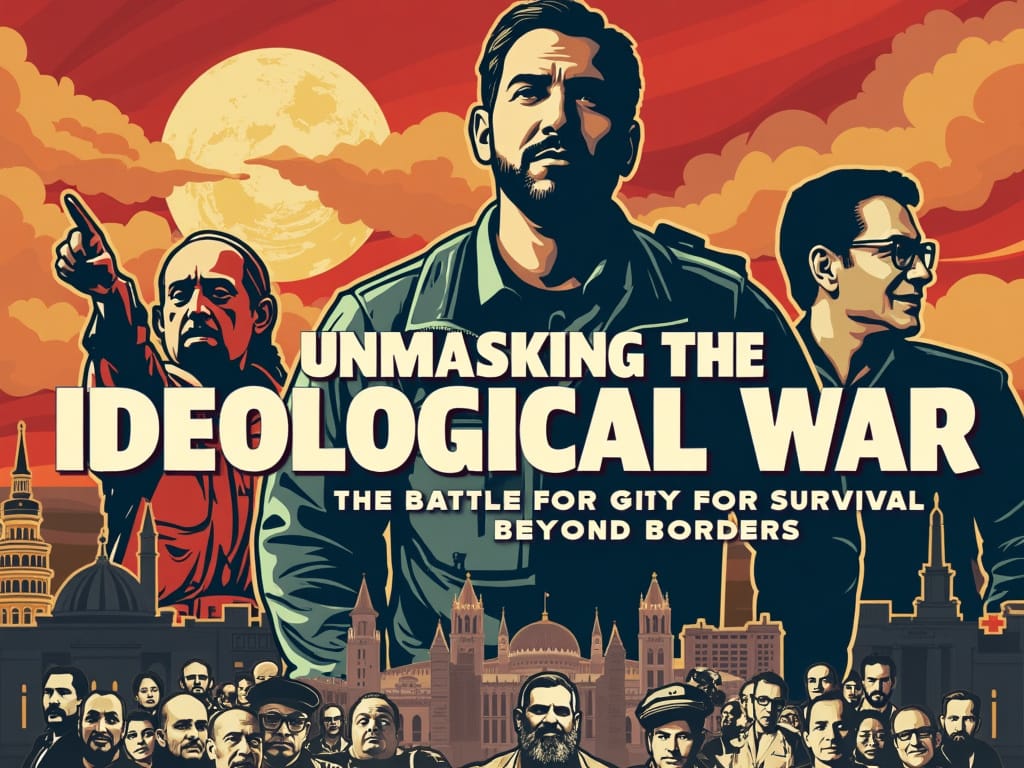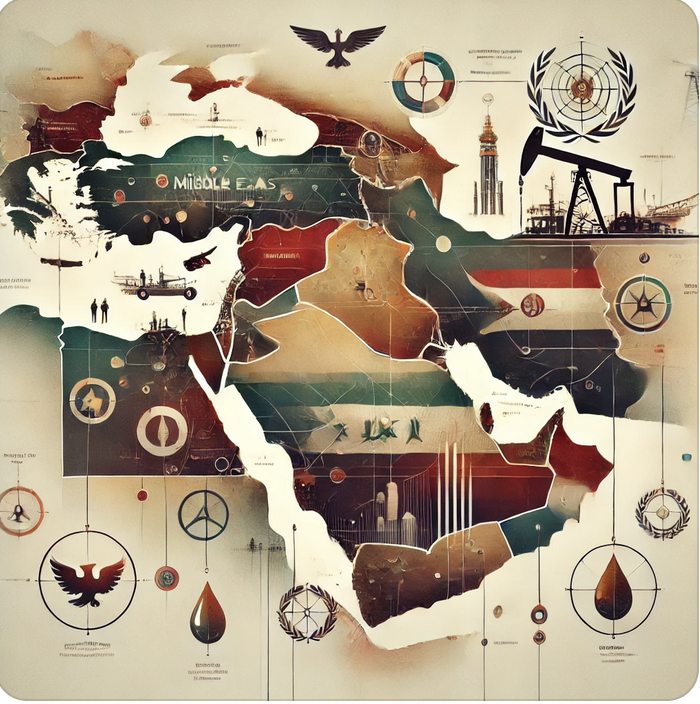

By Dr. Tim Orr
The Israeli-Palestinian conflict is far more than a territorial or political dispute; it is an ideological war that transcends land and sovereignty. The horrific attack by Hamas on October 7th, which claimed the lives of over 1,200 Israelis and resulted in the kidnapping of hundreds, starkly revealed the deeper forces at play. This conflict is driven by deeply ingrained theological, historical, and ideological hostilities that have festered for generations. Understanding this is essential because it explains why every attempt at peace has been hindered by more than mere geopolitical grievances.
The role of Iran in this conflict cannot be overlooked, as it serves as a key instigator and financial backer of groups like Hamas and Hezbollah. Iran's influence stretches beyond mere financial support; it provides weapons, training, and strategic guidance to these militant groups. Tehran views the destruction of Israel as central to its geopolitical and ideological ambitions in the region, using proxies like Hamas and Hezbollah to wage a sustained campaign against the Jewish state. Iran’s involvement transforms the Israeli-Palestinian conflict from a localized struggle into a flashpoint for broader regional tensions, where global powers and religious ideologies intersect. By fueling the conflict through its support of these groups, Iran ensures that the ideological hostilities are not just maintained but exacerbated, making the prospect of peace even more elusive.
This ideological foundation is precisely why I invest time in studying and addressing the issue—it is the only way to grasp the struggle's true nature and seek solutions beyond superficial negotiations. Without confronting the entrenched ideological beliefs fueling this conflict, we risk perpetuating a cycle of violence with no foreseeable end. More gravely, we risk another Holocaust, and tragically, this is not hyperbole. The depth of hatred, coupled with the military capabilities of groups like Hamas, Hezbollah, and their Iranian backers, and their calls for the destruction of the Jewish people, cannot be ignored or underestimated. Failing to address this reality is to invite catastrophic consequences.
Addressing the Ideological Roots of the Conflict
Any serious attempt to resolve the Israeli-Palestinian conflict must begin by addressing the deep ideological roots that fuel it. As long as nations like Iran or terrorist groups like Hezbollah and Hamas view the destruction of Israel not merely as a political goal but as a religious duty rooted in jihadist ideology, the prospect for peace will remain elusive. This ideology cannot be negotiated away, nor can concessions appease it. It requires a fundamental shift in the mindset that drives the conflict—one that acknowledges Israel’s right to exist and abandons the zero-sum approach that Hamas and its allies promote.
This jihadist ideology, rooted in the belief that the existence of a Jewish state on land once considered part of Dar al-Islam (the realm of Islam) is inherently illegitimate, has become the primary fuel for organizations like Hamas. For Hamas, the battle against Israel is not just about territory or political rights for Palestinians; it is a sacred struggle against an entity they view as an affront to Islamic rule. The fight is, therefore, not constrained to negotiating borders but about obliterating Israel and establishing an Islamic state in its place. This is why Hamas inherently rejects any notion of compromise or peace that involves Israel's continued existence.
Hamas' charter lays out this theological imperative. It refers to the destruction of Israel not as a policy goal but as a divine commandment. In Article 13 of its charter, Hamas states: "There is no solution for the Palestinian question except through Jihad." Hamas categorically rejects any political solutions, peace talks, or ceasefires, viewing them as temporary measures until they can achieve their ultimate goal. This is why peace processes, like the Oslo Accords or countless ceasefires, inevitably collapse. At its core, the conflict is not about establishing borders—it is about erasing them altogether.
This theological and ideological dimension is often overlooked or downplayed in Western analyses of the conflict, where it is more comfortable to view the struggle through the familiar lens of national liberation or colonialism. But this conflict is not akin to the nationalist struggles of the 20th century. While the Palestinian cause may have started with secular nationalist movements like Fatah, the rise of Hamas and other Islamist groups has redefined the struggle into an ideological war over religious sovereignty.
The Challenge for Israel: Defending Against Existential Threats While Addressing Global Narratives
For Israel, the challenge is immensely complex. On one hand, it must continue defending its citizens and territory from existential threats posed by groups like Hamas, Hezbollah, and Iran—all of whom share a commitment to the destruction of the Jewish state. This defense is not optional; it is a matter of survival. On the other hand, Israel faces the broader and equally daunting task of countering the global narratives that have framed its actions as oppressive or colonialist, particularly in the international media and academia.
Israel’s right to defend itself, while recognized in principle by much of the world, is consistently undermined by the narrative that casts it as the aggressor in the conflict. This is a narrative shaped by decades of propaganda, even by Arab Christians, and it has become deeply entrenched, particularly in progressive circles in the West. In this view, Israel is portrayed not as a small nation defending itself from annihilation but as a colonial power imposing its will on an oppressed indigenous population. This narrative has roots in postcolonial ideology, which reinterprets the Israeli-Palestinian conflict through the framework of European imperialism despite the Jewish people’s millennia-old connection to the land of Israel.
To counter these global narratives, Israel must engage in a concerted effort not only on the battlefield but in the diplomatic and information arenas. It must continue emphasizing its legitimate right to exist as a sovereign state grounded in international law and historical claims. Israel’s defense, while necessary, will not be sufficient in the long term unless it is paired with efforts to improve the living conditions of Palestinians, especially those trapped under the rule of extremist organizations like Hamas. Without addressing these conditions, the ideological extremism that fuels Hamas will continue to plague.
However, the burden of confronting this ideological extremism does not fall solely on Israel. The international community has a significant role to play in combating the dangerous narratives that support and justify violence against Israel. This means recognizing the difference between legitimate criticism of Israeli policies and the dangerous, widespread anti-Semitic rhetoric that seeks to delegitimize the Jewish state entirely. The international community must hold nations like Iran and extremist groups like Hezbollah and Hamas accountable for their actions and reject any form of moral inversion that attempts to justify terrorism as resistance.
The Inversion of Morality: How the West is Misled
One of the most striking aspects of the modern Israeli-Palestinian conflict is how moral arguments have been inverted in much of the global discourse, particularly in the West. Israel is frequently painted as the aggressor—an occupying power oppressing the Palestinian people—while groups like Hezbollah and Hamas are seen as representing legitimate resistance to colonial rule. This inversion of morality is partly the result of a broader ideological shift in the West, where identity politics and postcolonial narratives have become dominant frameworks for understanding global conflicts. In this view, the Palestinians are cast as the oppressed "natives" and the Israelis as the "settler-colonizers" backed by Western imperial powers.
This narrative, however, is deeply flawed and ignores the fundamental realities of the conflict. As scholars like Bernard Lewis have pointed out, the Jewish people are not outsiders or colonizers in the land of Israel—they are a people returning to their ancient homeland. The historical, religious, and cultural connection between the Jewish people and the land of Israel is undeniable, stretching back thousands of years. Moreover, the Zionist project, far from being a colonial enterprise, was a response to centuries of persecution and displacement, culminating in the horrors of the Holocaust. The establishment of Israel was not an imperialist venture but a necessary refuge for a people who had been systematically denied safety and sovereignty.
The moral inversion that casts Israel as the oppressor also ignores the reality of who Hamas is and what it stands for. Hamas is not fighting for Palestinian statehood or self-determination; it is fighting for the destruction of Israel and the establishment of an Islamic state governed by Sharia law. Hamas' consistent refusal to recognize Israel’s right to exist, its repeated acts of terrorism, and its ideological commitment to jihad are not merely responses to Israeli actions—they are the driving force behind the conflict. The international community’s failure to recognize this distinction has led to a situation where acts of terrorism, like the October 7th massacre, are downplayed or even justified as legitimate resistance.
Hamas’ Ideological Weaponization of Suffering
Hamas has become adept at weaponizing Palestinian suffering to advance its cause. The images of destruction and death that emerge from Gaza during each round of conflict are undeniably tragic, and they serve a dual purpose for Hamas. On one hand, these images generate international sympathy, rallying global public opinion against Israel. On the other hand, they help solidify Hamas' leadership within Palestinian society, portraying the group as the true defender of Palestinian honor and resistance against Israel.
What is often overlooked, however, is that Hamas deliberately orchestrates these tragedies. Its use of human shields—embedding military infrastructure within civilian areas, storing weapons in schools and hospitals, and refusing to build bomb shelters for its people while constructing a vast network of tunnels for its fighters—maximizes civilian casualties. Hamas’ goal is to draw Israeli fire onto civilian areas so that the resulting death toll can be used to fuel international outrage. The more Palestinians who die, the stronger Hamas' narrative becomes: Israel is portrayed as the aggressor, and attention is diverted away from Hamas' responsibility for the violence.
This cynical strategy is a reflection of Hamas' broader ideological commitment to jihad. For Hamas, the death of Palestinian civilians is not merely collateral damage—it is a necessary sacrifice in the fight against Israel. This is why Hamas has repeatedly rejected peace deals and ceasefires that would improve the lives of Palestinians. It views any compromise with Israel as a betrayal of its religious mandate to destroy the Jewish state. The international community must recognize this for what it is: a deliberate and callous exploitation of Palestinian lives for the sake of jihad.
The Globalization of the Conflict: Anti-Semitism and the New Left
The ideological battle between Israel and its enemies is not confined to the Middle East. In recent years, the conflict has become increasingly globalized, particularly as anti-Israel sentiment has been embraced by segments of the international left. This shift has brought with it a resurgence of global anti-Semitism, often disguised as anti-Zionism. The #FreePalestine movement, which has gained significant traction on social media, frequently blurs the line between legitimate criticism of Israeli policies and outright anti-Semitic rhetoric.
The demonization of Israel as an apartheid state, the equation of Zionism with racism, and the portrayal of Jews as colonial invaders are all part of this narrative. These ideas have been amplified by progressive movements around the world, where support for the Palestinian cause has become a litmus test for one’s moral and political credentials. However, this alignment between the Palestinian cause and global progressive movements has created a new form of anti-Semitism, one that is less concerned with traditional racial or religious hatred and more focused on delegitimizing the Jewish state.
This form of ideological anti-Semitism is no less dangerous than the more explicit forms that have plagued Jewish history. By disguising itself as a fight for justice and human rights, this new anti-Semitism has infiltrated mainstream political and cultural discourse, making it more difficult to confront and combat. The October 7th attack and the subsequent reactions from some segments of the global left revealed just how deeply this new anti-Semitism has permeated political discourse. The refusal to condemn Hamas' atrocities, coupled with the immediate focus on Israeli "oppression," demonstrated the extent to which the ideological inversion has taken hold.
The Path Forward: Addressing the Ideological Roots
Any meaningful attempt to resolve the Israeli-Palestinian conflict must begin by addressing the ideological roots that fuel it. As long as Hamas and other Islamist groups view the destruction of Israel as a religious duty, peace will remain elusive. International efforts must focus not only on political solutions but also on countering the ideological extremism that drives groups like Hamas.
For Israel, the challenge is to continue defending its right to exist while seeking ways to improve the lives of Palestinians in the territories. This is no easy task, given the nature of the enemy it faces, but it is essential for maintaining both security and international legitimacy. For the global community, the task is to confront the moral inversion that has skewed perceptions of the conflict and offer genuine support for solutions that address the real causes of the violence, not just its symptoms.
The Responsibility of the International Community
The international community plays a significant role in either perpetuating or resolving the conflict. Too often, well-meaning international interventions have focused on the symptoms of the conflict—such as territorial disputes or humanitarian crises—without addressing the underlying ideological war driving the violence. If peace is to be achieved, the global community must stop engaging in moral equivocation that legitimizes groups like Hamas and instead hold them accountable for their actions.
Efforts must be made to challenge and deconstruct the narratives that cast Israel as a colonial aggressor and Hamas as a legitimate freedom-fighting organization. Recognizing Hamas for what it is—a terrorist organization with a genocidal agenda—is crucial. Furthermore, the broader issue of global anti-Semitism, which often disguises itself as anti-Zionism, needs to be confronted head-on. No lasting solution can be reached until this ideological battle is acknowledged and dealt with.
The Path to True Peace
Achieving peace requires more than political negotiations; it demands a confrontation with the ideological roots of the conflict. Both the Israeli government and the international community must work together to undermine the extremist ideologies that fuel Hamas and its supporters. This will involve empowering moderate voices within Palestinian society, investing in education that promotes coexistence, and supporting genuine peace initiatives that recognize Israel’s right to exist as a sovereign state.
At the same time, Israel must continue to defend its people from existential threats while striving to improve conditions for Palestinians. This will not be easy, but peace is impossible without security, and security is unattainable, while groups like Hamas are allowed to operate with impunity.
Conclusion: A War of Ideas
Ultimately, the future of the Israeli-Palestinian conflict depends on whether the world is willing to recognize that this is not merely a battle over borders or land—it is an ideological war. Until this reality is addressed, the cycle of violence will continue. By unmasking the true nature of the conflict, we can begin to chart a path toward a future where both Israelis and Palestinians can live in peace and security, free from the grip of extremist ideologies.
This ideological war is global, and it demands a global response. Moral clarity, intellectual honesty, and a willingness to confront uncomfortable truths are essential. Only by addressing the core beliefs that drive the conflict can we hope to achieve lasting peace for both Israelis and Palestinians.
References
Kepel, G. (2006). Jihad: The trail of political Islam. I.B. Tauris
J-TV: Jewish Ideas. Global Relevance. (2024, October 7). Slaughtered Israelis ruined the narrative – Melanie Phillips on October 7 [Video]. YouTube. https://www.youtube.com/watch?v=C2_g824YVW0
Lewis, B. (1999). Semites and anti-Semites: An inquiry into conflict and prejudice. W.W. Norton & Company.
Netanyahu, B. (2001). Fighting terrorism: How democracies can defeat domestic and international terrorists. Farrar, Straus and Giroux.
Said, E. W. (1979). Orientalism. Pantheon Books.
Triggernometry. (2024, October 7). Why I’m off the fence about Israel’s war – Konstantin Kisin [Video]. YouTube. https://www.youtube.com/watch?v=O4m_EL9Dj2U&t=27s
Tim Orr is a scholar, Evangelical minister, conference speaker, and interfaith consultant with over 30 years of experience in cross-cultural ministry. He holds six degrees, including a master’s in Islamic studies from the Islamic College in London. Tim taught Religious Studies for 15 years at Indiana University Columbus and is now a Congregations and Polarization Project research associate at the Center for the Study of Religion and American Culture at Indiana University Indianapolis. He has spoken at universities, including Oxford University, the University of Tehran, and mosques throughout the U.K. His research focuses on American Evangelicalism, Islamic antisemitism, and Islamic feminism, and he has published widely, including articles in Islamic peer-reviewed journals and three books.
 Dr. Tim Orr's BlogDr. Tim Orr
Dr. Tim Orr's BlogDr. Tim Orr
 Dr. Tim Orr's BlogDr. Tim Orr
Dr. Tim Orr's BlogDr. Tim Orr
Sign up for Dr. Tim Orr's Blog
Dr. Tim Orr isn't just your average academic—he's a passionate advocate for interreligious dialogue, a seasoned academic, and an ordained Evangelical minister with a unique vision.
No spam. Unsubscribe anytime.
